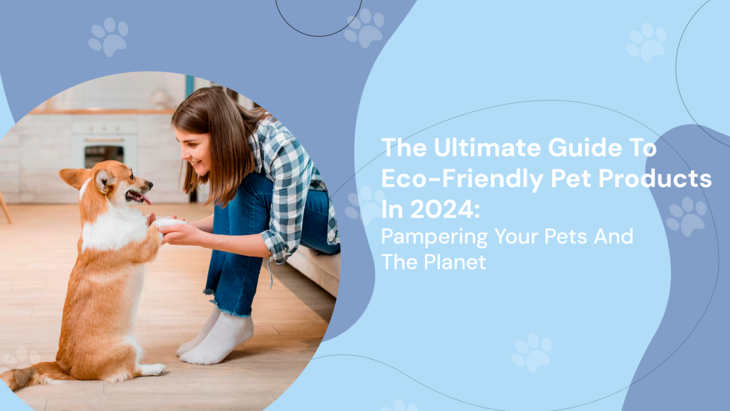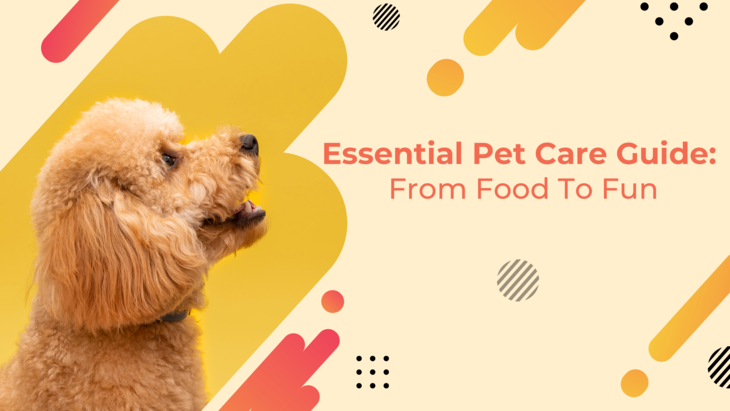In 2024, pet ownership is no longer just about furry (or feathery) companions – it's about conscious choices. Pet parents are increasingly concerned about the environmental impact of their choices, from the food their pets eat to the toys they play with. This growing eco-consciousness is driving a boom in the sustainable pet product market, offering a win-win situation for both pets and the planet.
This ultimate guide dives deep into the world of eco-friendly pet products, equipping you with the knowledge and resources to make informed decisions for your furry (or feathered) friend. We'll explore sustainable options across various pet care categories, highlighting the latest trends and the environmental benefits they offer.
Why Choose Eco-Friendly Pet Products?
Beyond the warm and fuzzy feeling of helping the planet, there are several compelling reasons to choose eco-friendly pet products:
- Reduced Environmental Impact: Traditional pet products often rely on unsustainable materials like plastic and heavily processed ingredients. Eco-friendly alternatives are made from renewable resources, recycled materials, or biodegradable materials, minimizing their environmental footprint.
- Improved Health for Pets: Many eco-friendly products are made from natural ingredients, which can be gentler on your pet's skin and digestive system. This is especially important for pets with allergies or sensitivities.
- Sustainable Practices: Companies offering eco-friendly pet products often prioritize ethical and sustainable practices throughout their supply chain. This can include responsible sourcing of materials, fair labor practices, and reduced carbon emissions.
Eco-Friendly Essentials for Every Pet
Now, let's delve into the exciting world of eco-friendly pet products across various categories:
Food:
- Sustainable Ingredients: Look for pet food companies using ethically sourced, high-quality ingredients like organic meat, whole grains, and sustainably sourced fish.
- Minimal Processing: Opt for minimally processed food with fewer fillers and artificial ingredients. This not only benefits your pet's health but also reduces energy consumption during production.
- Biodegradable Packaging: Choose pet food brands that use recyclable or compostable packaging to minimize landfill waste.
Treats:
- Natural Ingredients: Spoil your pet with treats made from natural ingredients like fruits, vegetables, and lean meats.
- Locally Sourced: Support local businesses by choosing treats made with locally sourced ingredients, reducing the carbon footprint associated with transportation.
- Limited-Ingredient Treats: Opt for treats with a limited number of ingredients, especially if your pet has allergies or sensitivities.
Beds and Bedding:
- Recycled Materials: Look for beds made from recycled materials like plastic bottles or eco-fibers derived from recycled content.
- Organic Materials: Consider beds made from organic materials like hemp or recycled cotton, which are soft on your pet and gentle on the environment.
- Biodegradable Fillers: Choose beds with biodegradable fillers like shredded recycled paper or buckwheat hulls, which can be composted at the end of their lifespan.
Bowls and Food Storage:
- Stainless Steel: Opt for durable, long-lasting stainless steel bowls that are easy to clean and won't leach harmful chemicals into your pet's food.
- Bamboo: Bamboo is a fast-growing, renewable resource. Look for food and water bowls made from bamboo, which are lightweight, durable, and naturally antibacterial.
- Recycled Plastic: If stainless steel or bamboo isn't your preference, consider bowls made from recycled plastic, giving new life to plastic waste.
Toys:
- Natural Materials: Choose toys made from natural materials like rubber, rope, or untreated wood. These are safer for your pet to chew on and biodegrade faster at the end of their lifespan.
- Recycled Materials: Explore toys made from recycled plastic or other recycled materials, reducing the need for virgin plastic production.
- Durable Construction: Opt for well-made, durable toys that can withstand chewing and playtime, minimizing waste from replacing broken toys frequently.
Waste Management:
- Compostable Poop Bags: Traditional plastic poop bags can take hundreds of years to decompose. Opt for compostable poop bags made from plant-based materials that break down quickly.
- Leak-proof Poop Scoops: Invest in a leak-proof poop scoop with a sturdy design to minimize waste and make cleaning up after your pet more efficient.
- Waste Disposal Options: Research local pet waste disposal options. Some communities offer composting programs specifically for pet waste.
Beyond Products: Sustainable Pet Care Practices
While eco-friendly products are a great start, there are additional steps you can take to minimize your pet's environmental impact:
- Reduced Water Consumption: Train your pet to drink from a water fountain instead of a constantly refilling bowl. This not only reduces water waste but can also encourage your pet to drink more frequently, which is beneficial for their health.
- Energy-Efficient Pet Care: Utilize energy-efficient options when possible. For example, air-dry your pet's fur instead of using a hairdryer, and choose LED light pet containment systems over traditional incandescent bulbs.
- Minimize Travel Emissions: Consolidate vet visits and other pet-related errands to minimize car trips. Consider carpooling with other pet owners or explore public transportation options if available.
- Second-hand Finds: Give pre-loved pet items a new life! Look for gently used pet beds, toys, and bowls at shelters, thrift stores, or online marketplaces. This reduces demand for new products and keeps usable items out of landfills.
- DIY Pet Care: Unleash your creativity with DIY projects. Make homemade treats with healthy ingredients, create braided tug toys from old t-shirts, or sew a cozy bed cover from scrap fabric.
Finding Eco-Friendly Pet Products: A Guide for Savvy Pet Parents
With the growing popularity of eco-friendly pet products, navigating the market can be overwhelming. Here are some tips to help you become a savvy eco-conscious pet parent:
- Look for Certifications: Several certifications indicate eco-friendly practices in pet products. Look for labels like USDA Organic for food, FSC (Forest Stewardship Council) for wood-based products, and Global Organic Textile Standard (GOTS) for organic fabrics.
- Research the Brand: Do your research! Explore the brand's website and social media presence to understand their commitment to sustainability. Look for companies with transparent practices and a focus on ethical sourcing and manufacturing.
- Read Reviews: Customer reviews can offer valuable insights into the quality and durability of eco-friendly pet products.
- Support Local Businesses: Whenever possible, support local pet stores that carry eco-friendly products. This reduces the environmental impact of transportation and strengthens your local community.
Conclusion
By making informed choices about the pet products you purchase and adopting sustainable pet care practices, you can significantly reduce your pet's environmental footprint. Remember, every small step counts! The ultimate guide to eco-friendly pet products isn't just about buying things – it's about embracing a lifestyle that prioritizes the well-being of your pet and the health of our planet.







Post Comments